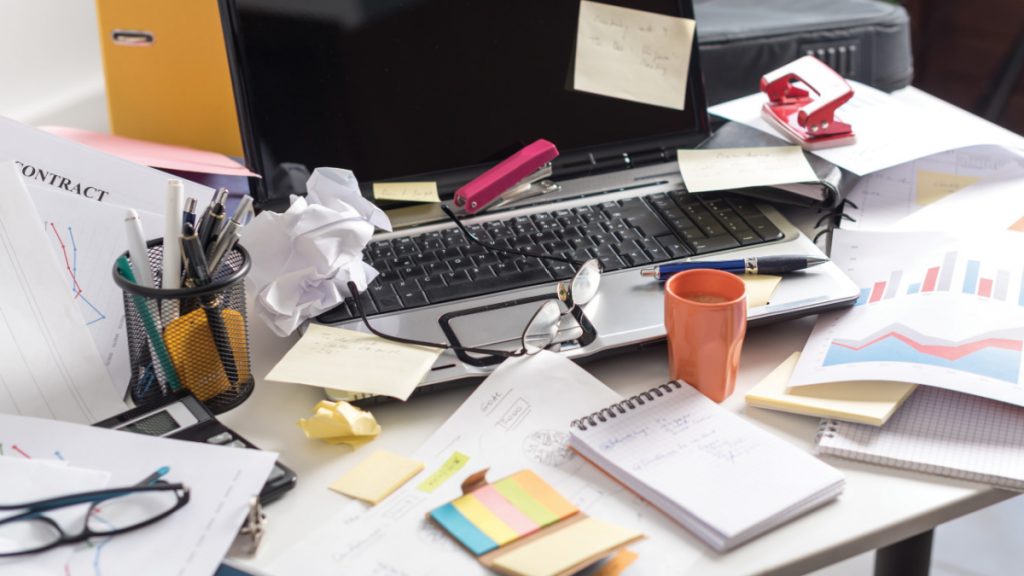Clear the Clutter, Clear Your Mind
04/15/2022
By Molly Rose Teuke
“Clutter makes everything so much worse.” — Chrissy Halton, blogger at organizemyhouse.com
Ever since Marie Kondo hit the big time with her best- selling book, “The Life-Changing Magic of Tidying Up: The Japanese Art of Decluttering and Organizing,” and her popular Netflix series, “Tidying Up with Marie Kondo,” decluttering has become the holy grail. This is true at home and at work — and with so many of us now working from home, a cluttered home environment can be undermining our effectiveness both at work and in life.
Clutter might be defined as anything that violates Benjamin Franklin’s “a place for everything, everything in its place” maxim. Sometimes, eliminating clutter is as simple as tidying up and putting things away. A pile of loose change, too many socks on the bedroom floor, books that spill out of bookshelves, stacks of magazines.
“Clutter symbolizes an unmade decision,” says Christine Louise Hohlbaum, author of “The Power of Slow: 101 Ways to Save Time in our 24/7 World.” “We look at something, stuff it away or drop it on a surface somewhere, and label it in our minds as ‘to be handled later.’ Clutter is the physical manifestation of procrastination, items in various stages of decision- making (or not).”
In 1927, pioneering psychiatrist Bluma Zeigarnik wrote, “Our minds quickly forget finished tasks. However, they are programmed to continually interrupt us with reminders of unfinished tasks.” Until you make a decision on what to do with that “something,” your brain wants to keep it front and center, thanks to what neuroscientists call the Zeigarnik effect.
CLUTTER AND PRODUCTIVITY
Picture this: You’re trying to focus on a task and are continually distracted by a talk radio station you have on. That’s an aural disruption. Now picture this: You’re trying to focus on a task in the midst of a cluttered, visually “noisy” environment. Any time you glance up, your attention is caught by yesterday’s coffee mug, paperwork that needs filing, reminders of phone calls that need returning, the ruler and scissors you used and didn’t put away, the sticky note that reminds you to stop at the grocery store.
Clutter can also be too many open windows on your computer, notifications that are always on, an out-of- control email inbox, even excess photos on your photo app — anything that deflects your attention when you’re trying to get something done. Self-care coach and blogger Eleanor Brownn takes the definition a bit further: “Clutter is not just physical stuff. It’s old ideas, toxic relationships and bad habits. Clutter is anything that does not support your better self.”
Any time your brain perceives a data point — clutter of any kind — it struggles to attend to it, no matter how unimportant. Your brain needs to check it out before deciding whether it’s a threat or some insignificant detail that’s safe to ignore. You may not be aware of the mental struggle, but that doesn’t make it less real. It’s exhausting for your brain, whether or not you feel it physically.
In 1998, former high-tech executive Linda Stone coined the term “continuous partial attention.” She had technology overload in mind, yet it works for clutter, too. She describes it as “an always on, anywhere, any time, any place behavior that creates an artificial sense of crisis. We are always on high alert … In this state of always-on crisis, our adrenalized fight-or-flight mechanism kicks in.” And, she adds, we have more attention- and stress-related diseases than ever before. Not to mention just more plain, old stress.
That’s because any time you adopt a fight-or- flight response, the stress hormone cortisol floods your brain, making you feel stressed, uncomfortable and unhappy. Cortisol washes out the more benign hormones and neurotransmitters dopamine and serotonin, which have the opposite effect: They make you feel good.
360-DEGREE IMPACT
It’s tempting to deflect the notion that clutter is an issue. You may think it doesn’t affect you, but science says otherwise. A vast and credible body of research in recent decades underscores that clutter’s impact on the brain has an impact on you in many ways, both mental and physical.
Your brain has a hard time focusing in a cluttered environment. In one study, subjects performing a data input task made more mistakes when working in a cluttered environment than a tidy one. That old saw, “I can’t hear myself think,” could just as easily be, “I can’t see myself think.”
You lose a degree of impulse control. Inhibiting is an important part of your brain’s job description. When you are surrounded by clutter, you weaken that critical brain function — inhibition — and you are more likely to act without benefit of the brain’s braking system, whether it’s making an impulse purchase or blurting out a remark better left unsaid. “We expect that, if an individual creates a messy environment, their surroundings would be more mentally depleting and lead to an even lower sense of personal control,” researchers write in the Journal of Consumer Research.
Your problem-solving skill diminishes in an untidy environment. Clutter hijacks mental resources you might otherwise use for creative thinking, brainstorming and problem solving.
Your short-term memory is compromised when you’re surrounded by clutter. Research at the University of Toronto suggests that mental clutter is responsible, in part, for age- related memory loss. Physical clutter is one source of mental clutter.
You have a harder time reading emotions. Research at Cornell University used movies to learn what it takes to quickly and accurately read someone’s facial expressions. Clutter is not conducive to an accurate read. Filmmakers know this and cut the clutter when emotion is important to a scene. “What filmmakers are indirectly telling us is that clutter costs in visual perception,” says James Cutting, chair of Cornell’s Department of Psychology.
Clutter is consistently linked to weight gain. Some sources suggest that people who live in cluttered homes are 77% more likely to be overweight. No wonder home organizer Peter Walsh titled one of his books, “Lose the Clutter, Lose the Weight.” “People can’t make their best choices — their healthiest choices — in a cluttered, messy, disorganized home,” he says.
You don’t sleep as well in a cluttered bedroom either. Surrounded by “stuff,” your brain has a harder time powering down and staying powered down. A few things left out might not have a big impact, but researchers from St. Lawrence University found “that those at risk of hoarding disorder may have serious complaints about sleep.” Not necessarily hoarders, but those “at risk” of hoarding. In other words, serious clutterers.
READY, SET, DECLUTTER!
If you’re bothered by clutter, or are now convinced it’s not good for you, and you feel inspired to clean house, seize that motivation and get started.
Find a decluttering program that feels like a good fit for you. There’s even clutterersanonymous.org if you need moral support. As you tidy up, remind yourself that you’re giving your brain a priceless gift, and making yourself — and possibly a lot of other people — happier, healthier and freer.
As American writer, historian and philosopher Will Durant wrote, “In my youth, I stressed freedom, and in my old age, I stress order. I have made the great discovery that liberty is a product of order.”











